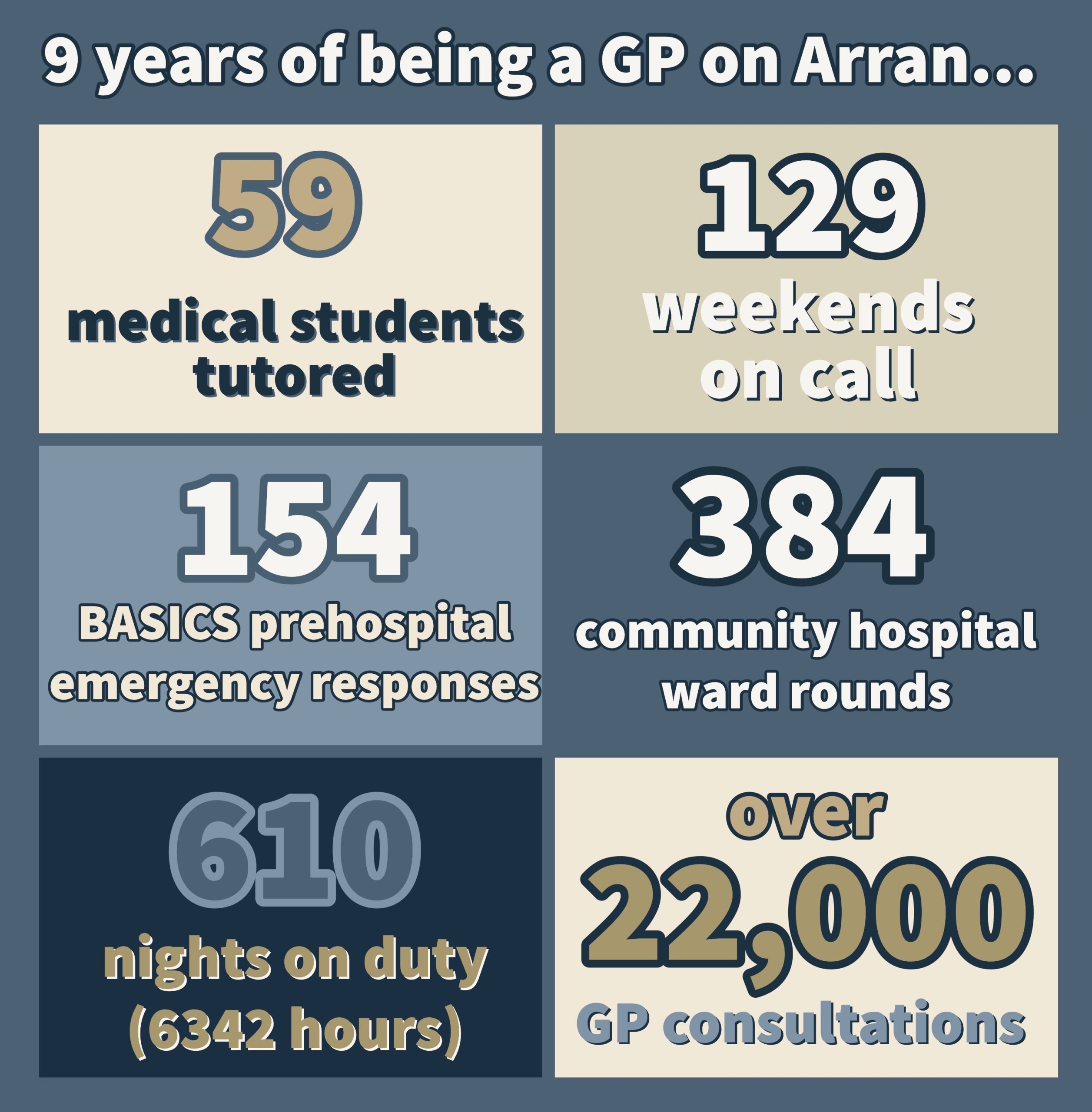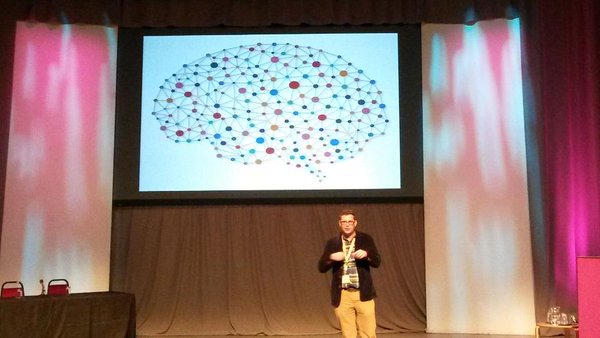.01
ABOUT
SUMMARY
Dr David R Hogg BSc(MedSci) MBChB DCH FRCGP
Portfolio GP, East Lothian & Scottish Borders
Honorary Clinical Senior Lecturer (Medicine), University of Glasgow
Honorary Clinical Senior Lecturer (Medicine), University of Edinburgh
GMC 612 8595
From 2010-2019 I was a GP on the Isle of Arran in Scotland. As a partner in an island-wide group medical practice, this involved providing medical care to a population that fluctuated from 5,000 to 25,000 people, on an island the size of Greater Glasgow. As rural GPs we provided core general practice as well as prehospital medicine, A&E, intermediate and palliative care.
In July 2019 I relocated to East Lothian,. I worked in Tranent Medical Practice until January 2020 and worked as a locum throughout the county. In January 2020 I joined Lauderdale Medical Practice, Dunbar, becoming a GP Principal (Partner) from April 2020. I teach students from Edinburgh University and continue to do out-of-hours work with Lothian Unscheduled Care Service (LUCS).
In March 2022 I left Lauderdale Medical Practice and continued locumming accross East Lothian and the Scottish Borders.. I have also enjoyed continuing teaching and other roles detailed below..
In May 2023 I had to stop my clinical roles abruptly when I was diagnosed with a brain tumour. This has required surgery and a considerable time away from work since then. My aim is to return to some of these roles if/when that is possible.
GENERAL PRACTICE
Portfolio GP in East Lothian
GP Principal at Lauderdale Medical Practice, Dunbar (April 2020 - March 2022).
Salaried GP at Lauderdale Medical Practice (Jan-Apr 2020).
Salaried GP at Tranent Medical Practice (July 2019 - Jan 2020).
GP at Arran Medical Group 2010 - 2019 (GP Principal 2013 - April 2019).
MRCGP in 2010. FRCGP in 2018.
I enjoy providing the broad spectrum of generalist medical care that general practice requires. I have clinical interests in mental health, adolescent/young people's health and respiratory medicine.
TEACHING/EDUCATION
Professional Mentor/Personal Tutor, University of Edinburgh Medical School (2021-present)
Honorary Clinical Senior Lecturer, University of Edinburgh (2020-present)
Honorary Clinical Senior Lecturer, University of Glasgow (2014-present)
Honorary Senior Clinical Teacher, Dundee University (2016-19)
GP Tutor to over 60 medical students (Glasgow, Dundee, Edinburgh & London medical schools)
GP Rural Fellowship Supervisor 2014-2019.
Experienced in delivering GPST, paramedic and nurse practitioner training (including as Designated Medical Practitioner).
Experienced in simulation training (Laerdal SimMan and QCPR systems).
Practice-Based Small Group Learning Facilitator.
INFORMATION/COMMUNICATION TECHNOLOGIES
IT Lead at Arran Medical Group for over 6 years.
Fluent in WordPress and Sharepoint, including independently designing intranet and internet platforms for Arran Medical Group and latterly, Dunbar Medical Centre.
Deployment of social media channels including Facebook, Instagram and Twitter channels (@dunbargp).
Deployment of video and photography for recruitment material and induction information. (See BBC News article).
ACUTE/EMERGENCY CARE
Previously experienced in providing a wide range of out-of-hours and emergency/urgent/palliative care services
Regular (1 in 8) rota to lead ward rounds and complex care to 11-bed community hospital inpatients.
Regular PHECC and PHPLS qualification updates.
Attended over 140 BASICS calls, including cardiac arrest, major trauma, and difficult paediatric/obstetric cases.
MIMMS trained and Major Incident Medical Commander on Arran for 5 days protracted weather incident in 2013.
RNLI Lifeboat Medical Adviser (Level 1) for Eyemouth RNLI Lifeboat (2021-present)
Team member of Arran Mountain Rescue Team (2013-2018)
RNLI Lifeboat Medical Advisor to Lamlash crew, Isle of Arran (2017-2019, Deputy 2015-2017).
Previously competent and experienced in remote & rural A&E such as patient stabilisation, procedural sedation, x-ray interpretation, IV/IO/IN access, suturing, plaster-casting etc.
Experience of transfer logistics including helicopter and ScotSTAR capabiities. iSAR, AIRWAVE and VHF radio competent.
LEADERSHIP Completed Collaborative Leadership in Practice training (2018).
On Arran we merged our 3 practices in 2012. My specific input to this included developing IT platforms and overseeing a cohesive practice strategy to preserve multi-site patient access to a range of generalist and specialist services.
Previous experience as lead partner for young people's health, respiratory medicine, patient access/GP templates, information & communication technology, undergraduate teaching and Rural Fellowship.
Chair of the Rural GP Association of Scotland from November 2016-2018.
Member of RCGP Scottish Council from 2012 to 2017.
I'm also interested in photography and music. You can view my photography portfolio at www.davidrhogg.com.
Portfolio GP, East Lothian & Scottish Borders
Honorary Clinical Senior Lecturer (Medicine), University of Glasgow
Honorary Clinical Senior Lecturer (Medicine), University of Edinburgh
GMC 612 8595
From 2010-2019 I was a GP on the Isle of Arran in Scotland. As a partner in an island-wide group medical practice, this involved providing medical care to a population that fluctuated from 5,000 to 25,000 people, on an island the size of Greater Glasgow. As rural GPs we provided core general practice as well as prehospital medicine, A&E, intermediate and palliative care.
In July 2019 I relocated to East Lothian,. I worked in Tranent Medical Practice until January 2020 and worked as a locum throughout the county. In January 2020 I joined Lauderdale Medical Practice, Dunbar, becoming a GP Principal (Partner) from April 2020. I teach students from Edinburgh University and continue to do out-of-hours work with Lothian Unscheduled Care Service (LUCS).
In March 2022 I left Lauderdale Medical Practice and continued locumming accross East Lothian and the Scottish Borders.. I have also enjoyed continuing teaching and other roles detailed below..
In May 2023 I had to stop my clinical roles abruptly when I was diagnosed with a brain tumour. This has required surgery and a considerable time away from work since then. My aim is to return to some of these roles if/when that is possible.
GENERAL PRACTICE
TEACHING/EDUCATION
INFORMATION/COMMUNICATION TECHNOLOGIES
ACUTE/EMERGENCY CARE
LEADERSHIP
I'm also interested in photography and music. You can view my photography portfolio at www.davidrhogg.com.
Contact Details
I am unable to respond to patients by email.
For matters related to patient care...
Please find me on the NHS Lothian global address book for any sensitive or patient-related correspondence.
For matters related to teaching at Edinburgh University...
david.hogg@ed.ac.uk
For matters related to teaching at Glasgow University...
david.hogg@glasgow.ac.uk
For matters related to RNLI...
david_hogg@rnli.org.uk
For matters related to patient care...
Please find me on the NHS Lothian global address book for any sensitive or patient-related correspondence.
For matters related to teaching at Edinburgh University...
david.hogg@ed.ac.uk
For matters related to teaching at Glasgow University...
david.hogg@glasgow.ac.uk
For matters related to RNLI...
david_hogg@rnli.org.uk
Patient Information Links
Here's some links that I find useful to signpost patients to during consultations. If I have seen you as a patient, I may have recommended these to you, in which case scroll down to the appropriate section to find the link mentioned.
General Information
- Fit For Travel
- Health Talk
- National Debtline (Scottish site)
- NHS (Scotland) Inform
- Patient.info
- Embarrassing Bodies
Alcohol
Asthma
- Asthma UK - includes useful videos on inhaler technique
Bones, Muscles & Joints
- Lower Back Pain - patient.co.uk leaflet
- Musculoskeletal Advice and Self-Referral - for physio/joint problems via the NHS Inform website
- MSK Scotland NHSInform website
Care
- Carers UK
- Citizens' Advice: Guide to Benefits
- YoungScot guide for Young Carers
Children & Pregnancy
- Ready Steady Baby
- Ready Steady Toddler
- When should I worry?: A guide to self-limiting illness in children
- ERIC - helpful guide and resources for bedwetting
- School illness guide
- Immunisations Scotland
Patient Forms
Head & Neck
Lifestyle
Men's Health
Mental Health
Student/Young People's Health
- The Lowdown (great website from New Zealand)
- Think Positive' - Student Mental Health resource
- The Mix - 'Essential Support for Under 25s'
- Young Minds




















